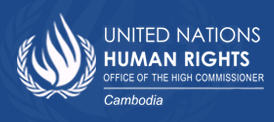
Under domestic and international law, all persons – including lesbian, gay, bisexual and transgender (LGBT) persons — are entitled to the same rights as other individuals. Article 1 of the Universal Declaration of Human Rights affirms that all human beings are born free and equal in dignity and rights, and that everyone is entitled to all rights and freedoms without distinction of any kind. These principles of universality, equality and non-discrimination are also embodied in the Charter of the United Nations and human rights treaties.
Article 31 of the Cambodian Constitution reaffirms these principles in its recognition and respect for human rights as stipulated in the international treaties, providing that all Khmer citizens are “equal before the law, enjoying the same rights, freedom and fulfilling the same obligation” regardless of their distinctive statuses; and shall “have the right to participate actively in the political, economic, social and cultural life of the nation.” (Article 35)
Though same-sex relations are not criminalized, they are neither protected nor recognized by Cambodian law. Existing legislation does not specifically prohibit discrimination based on sexual orientation and gender identity, and there are no sanctions for those who violate the human rights of LGBT persons. Therefore, LGBT persons often face a “high level of stigma, discrimination and exclusion in a variety of settings such as home, school, the workplace, health facilities, and public spaces.” Many, in particular transgender persons, often find themselves isolated and vulnerable, and without the skills or knowledge to sustain themselves. This lack of recognition and protection of the sexual minority rights deters LGBT individuals from fully enjoying the rights to participate in the political, social, economic, cultural and inclusive development of the Kingdom.
Recently the Royal Government of Cambodia has shown commitment and initiative to include LGBT persons in various plans and programs. A research study on the LGBT community was commissioned by the Social Protection Coordination Unit of the Council for Agricultural and Rural Development in 2013, and the Cambodian National Strategic Plan on HIV/AIDS, as well as the 2nd National Action Plan to Prevent Violence Against Women, specifically address the needs of LGBT persons. Former Majesty King Father Norodom Sihanouk, some politicians and government officials at the national and subnational levels have spoken out against violence, stigma and discrimination against LGBT persons.
Beyond the legal framework and political leadership, there is a need for social behavioural change, especially at the local level, mobilizing people from all walks of society in support of LGBT rights, including local, religious and community leaders, media, civil society, the education system and the private sector.
Read more: